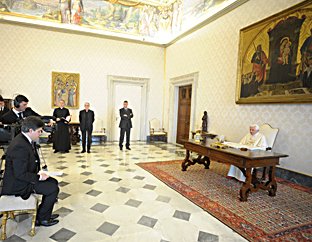Only the strength of love
 Interview with Benedict XVI on «In his image» broadcast by Rai Uno.
Interview with Benedict XVI on «In his image» broadcast by Rai Uno.
In a rare interview broadcast today on Italian television RAI, Pope Benedict XVI answered questions submitted by people from around the world. (See full transcript below) Touching on topics ranging from Iraq to the Resurrection, the Pope demonstrated his unique capacity to offer profound analysis of political, ethical and theological issues in a simple way.
To a seven-year-old girl from Japan, Pope Benedict said that the suffering of the Japanese people due to the earthquake is not in vain, and one day they will understand that behind their pain lies a divine plan for good, although it is difficult to understand right now. Jesus, too, the Pope said, suffered innocently just as the Japanese people. The most important thing to understand right now, the Pope said to the young girl, is that “God loves me,” even if it seems He doesn’t know me.
An Italian mother whose son has been in a vegetative state since 2009, was comforted by the Pope who told her that her son’s soul is still present, despite his bodily state, and that her continued love enters into her son’s “hidden soul,” and acts as a witness for all humanity in her respect for his life.
To a young Christian in Baghdad the Pope offered his solidarity to all the communities, Christian and Muslim, of Iraq and expressed the desire that the international community work together to assist Iraqis in reconciling their shattered society and in remembering that despite their diversity, they are a community with a shared history, in which there is a place for each member.
A Muslim woman named Bintu from the Ivory Coast, a country at war for years now, asked the Pope whom she called an “ambassador for Jesus,” for his advice for her country. Pope Benedict said that he too felt their sadness and their sense that one can do so little. However, the Pope said, we can pray together and work together to bring humanitarian and political aid there, something which the Vatican is seeking to do. The Pope also denounced violence, saying that violence never comes from God and never brings good things. Jesus, Pope Benedict said, was the ultimate example of non-violence as he came on earth not using violence as his instrument but he came in weakness, using only the force of love.
On a question of what happened to Jesus after his crucifixion and before the Resurrection, when he descended to Hell, Pope Benedict offered the explanation that the descent of Jesus was not geographical one, but one of the spirit. That it should be understood mostly as Jesus’ redemption of past history when, as the Church Fathers have said, he took Adam and Eve, that is, all of humanity, by the hand and guided them upwards, giving them access to God, to Heaven. So the descent into Hell is understood as Jesus’ entering into the depths of the human being and redeeming him. Our lives, the Pope said, are different since we are already redeemed by the Savior and after our death we will arrive at the Final Judgment and experience the purifying gaze of Jesus, of which we all to greater or lesser degrees will have need. The gaze of Jesus, which purifies us, allows us to live in Heaven with God, the Saints and those we have known in this life.
On another question about the Resurrection, the Pope said that Jesus’ bodily resurrection shows that even physical matter is destined for eternity and that Jesus glorious body after the resurrection, although difficult to define because it is outside of our experience, shows us that there is a new condition of life, a new world, towards which we are all heading. Jesus’ body after the resurrection is fully human, not a ghost, but one that lives a new life no longer subject to the laws of death. This, the Pope says, is the great promise of the Resurrection for us. In the Eucharist, Jesus gives us his resurrected body, not a biological one to eat, and therefore we are transformed and already in contact with this new life through Jesus entering into us in the Eucharist.
Finally, answering a question about the role of Mary, the Pope said that his predecessors, Pius XII, Paul VI and John Paul II had all made great public acts of entrusting the Church to Mary and that now was the time to let this gesture penetrate and be achieved in us. Perhaps one day, the Pope said, it may be necessary to repeat the act of his predecessors, but for now the Pope said, that is not his intention. He instead invited the Church to fully interiorize this act individually and collectively as a Marian Church.


 Votes : 0
Votes : 0









